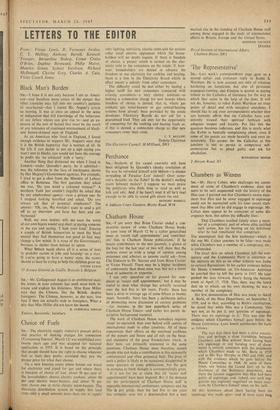Choice of Fuels
SIR,--The electricity supply industry's present policy, and practice of making . charges for connection ('Consuming Interest', March 12) was established over twelve years ago and was accepted for national application in 1955. It is based on the principle that people should have the right to choose whatever fuel or fuels they prefer, provided they pay the proper price for what they choose.
On a new housing estate where houses are wired for electricity and piped for gas and where there is freedom of choice of fuel, about 50 per cent of the householders choose electric cookers, about 60 Per cent electric water-heaters, and about 70 per cent choose one or more electric room-heaters. The electricity distribution system to supply this load costs only a small amount more than one to supply only lighting, television, electric irons and the various other small electric appliances which the house- holders will no doubt require. If there is freedom of choice, a proper return is earned on the elec- tricity sold to the consumers on the estate; if. how- ever, householders are denied in advance the freedom to use electricity for cooking and heating, there is a loss to the Electricity Board which in effect means a subsidy from other consumers.
The difficulty could be met either by having a higher tariff for new consumers compared with existing consumers—a very clumsy solution—or making a connection charge for new houses where freedom of choice is denied; that is, where gas cookers, gas water-heaters or gas central-heating systems have already been provided by the estate developer. Electricity Boards do not ask for a guaranteed load. They ask only for the opportunity of competing for the cooking and heating loads or, if this is denied, a connection charge so that new consumers cover their costs.
C. T. MELLING Deputy Chairman
The Electricity Council, 30 Millbank, SW!














































 Previous page
Previous page